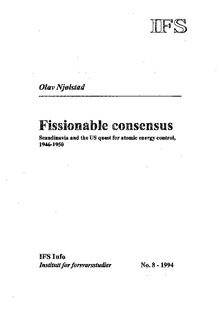| dc.contributor.author | Njølstad, Olav | |
| dc.date.accessioned | 2011-10-06T08:21:01Z | |
| dc.date.available | 2011-10-06T08:21:01Z | |
| dc.date.issued | 1994 | |
| dc.identifier.issn | 0803-1061 | |
| dc.identifier.uri | http://hdl.handle.net/11250/99443 | |
| dc.description | Between 1946 and 1950 the UN worked on a plan for preventing the spread of nuclear weapons. The plan would put strong limitations to and control over independent states abilities to develop nuclear energy and weapons. This plan gained support from many western states. Olav Njøstad raises the question of why they supported the plan, by using the Scandinavian countries as examples. | en_US |
| dc.language.iso | eng | en_US |
| dc.publisher | Institutt for Forsvarsstudier | en_US |
| dc.relation.ispartofseries | IFS Info;8 | |
| dc.subject | Atomvåpen | en_US |
| dc.subject | nedrustning | en_US |
| dc.subject | Skandinavia | en_US |
| dc.title | Fissionable consensus: Scandinavia and the US quest for atomic energy control, 1946-1950 | en_US |
| dc.type | Others | en_US |
| dc.source.pagenumber | 13 s. | en_US |
